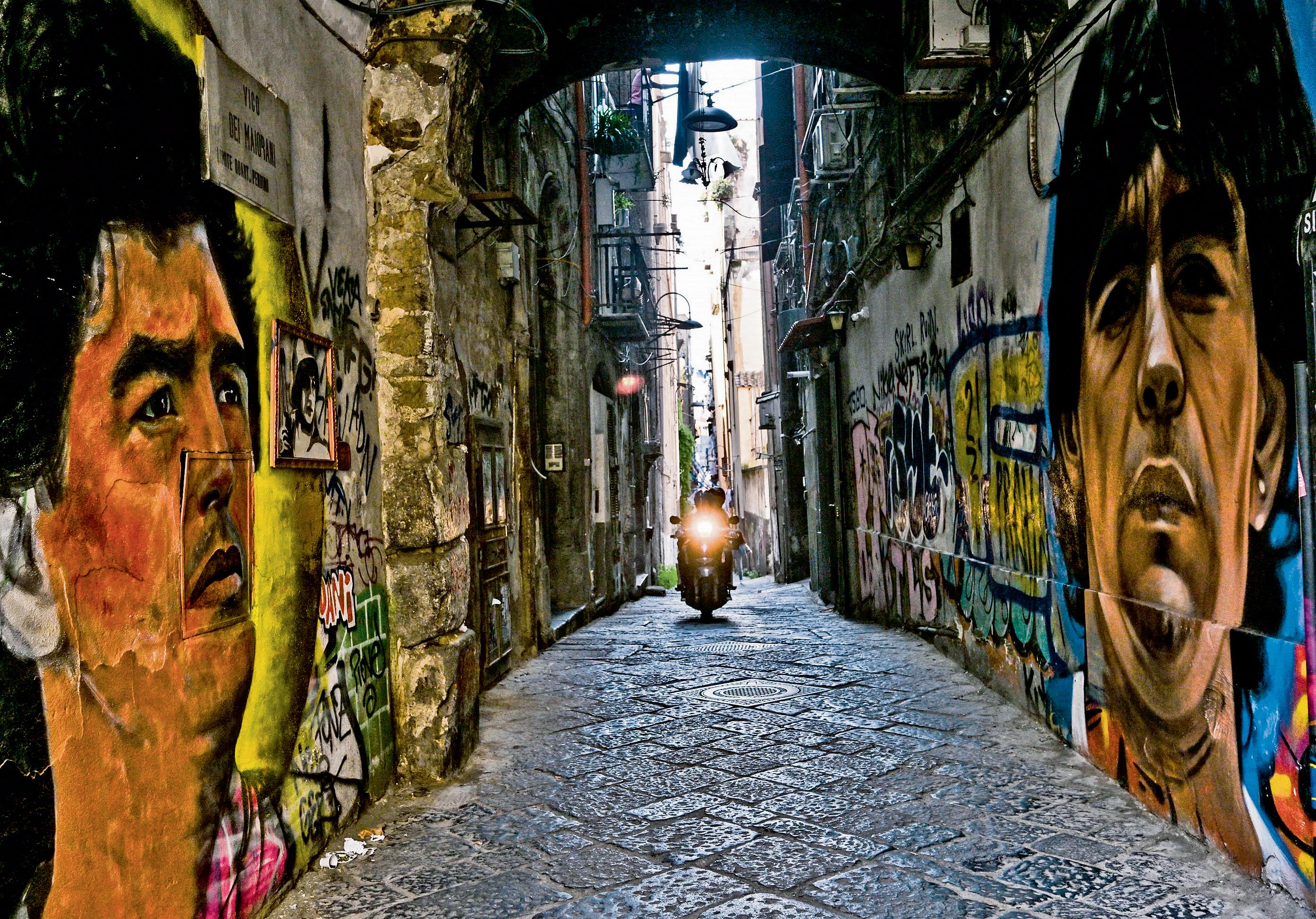
It's sometimes the fate of a single city to epitomise an era: Berlin in the 1920s, perhaps, or London in the 1960s. So which one would represent our own period of ecological anxiety, true crime and fake news? I'd wager it's one you might not suspect: Naples. In terms of cultural clout, the place is booming. The city's famous bay, flanked by Mount Vesuvius, is on every TV schedule and streaming platform: from Paolo Sorrentino's The Hand of God, an autobiographical movie about parental loss, to Ultras, which documents the warring factions of a Neapolitan hooligan crew, via Mare Fuori (The Sea Beyond - RAI's cult TV series about a youth detention centre in the city) and Mixed by Erry, this year's Netflix hit about music bootleggers in the 1980s.
In May, Napoli even won the scudetto, the Serie A football championship, for the first time since 1990. The fact that their leading striker, Victor Osimhen, wore a black face mask and had a Neapolitan sun peroxided into his hair only made the story more enticing.
Naples's return to global notoriety is largely down to Roberto Saviano. His docu-novel, Gomorrah, gave rise to an eponymous film by Matteo Garrone, a five-season series running from 2014 to 2021 and a "mid-quel" film, L'Immortale. Saviano has made the most of his success. Living under armed guard, he has been a vocal opponent of the city's mafia, the Camorra, and is rarely off Italy's front pages as he takes principled stands on criminality, fascism and corruption. Other novels, La Paranza dei Bambini and ZeroZeroZero, have been turned into a film (released as Piranhas in English) and an eight-part series respectively.
This story is from the October 06, 2023 edition of The Guardian Weekly.
Start your 7-day Magzter GOLD free trial to access thousands of curated premium stories, and 9,000+ magazines and newspapers.
Already a subscriber ? Sign In
This story is from the October 06, 2023 edition of The Guardian Weekly.
Start your 7-day Magzter GOLD free trial to access thousands of curated premium stories, and 9,000+ magazines and newspapers.
Already a subscriber? Sign In

The Saudi football World Cup is an act of violence and disdain
Well, that's that then. In the event there were only two notes of jeopardy around Fifa's extraordinary virtual congress last week to announce the winning mono-bids, the vote without a vote, for the right to host the 2030 and 2034 football World Cups.

AI has made the move into video and it's worryingly plausible
I recently had the opportunity to see a demo of Sora, OpenAI's video generation tool, which was released in the US last Monday, and it was so impressive it made me worried for the future.

With tyrant Assad ousted, Syrians deserve support and hope
Last week, time collapsed. Bashar al-Assad's fall recalled scenes across the region from the start of the Arab spring almost 14 years ago. Suddenly history felt vivid, its memories sharpened. In fact it no longer felt like history.

TV
The Guardian Weekly team reveals our small-screen picks of the year, from the underground vaults of post-apocalyptic Fallout to the mile-high escapism of Rivals

Albums
Murky love stories, nostalgic pop and an in-your-face masterpiece captured our critics' ears in 2024

Film
Visual language, sound, light and rhythm are to the fore in the best movies of the year

Hidden delights Our 24 travel finds of 2024
Guardian travel writers share their discoveries of the year, from Læsø to Lazio

'It's really a disaster' The fight to save lives as gang war consumes capital
Dr James Gana stepped out on to the balcony of his hospital overlooking a city under siege. \"There's a sensation of 'What's next?'. Desperation is definitely present,\" the Médecins Sans Frontières (MSF) medic said, as he stared down at one of scores of camps for displaced Haitians in their country's violence-plagued capital.

Trailblazers The inspiring people we met around the world this year
From an exuberant mountaineer to a woman defiantly facing the guns of war, here are some of the brave individuals who gave us hope in a tumultuous 2024

Votes of confidence
From India to Venezuela and Senegal to the US, more people voted this year than ever before, with over 80 elections across the world. With rising authoritarianism and citizen-led resistance revealing its vulnerabilities and resilience in the face of unprecedented challenges, has democracy reached its breaking or turning point?